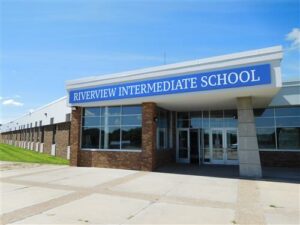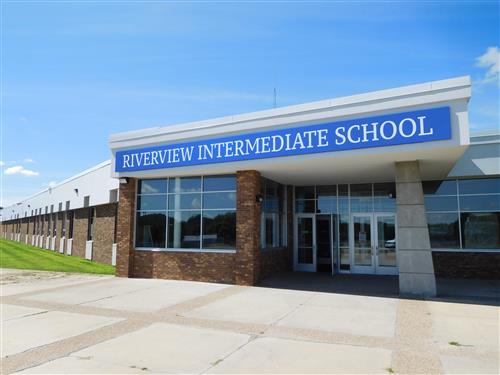by Jessica Tomhave
No definite decision resulted from a public session Oct. 10 about a proposed major update to an HVAC (heating, ventilation, air-conditioning) system at Riverview Intermediate School.
The meeting was held by the Sartell-St. Stephen School in the modernized commons area at RIS.
On the listening panel were Sartell-St. Stephen Interim Superintendent Tom Lee; the district’s Lead Custodian Jesse Paggen; Director of Business Services Joe Prom; and four of the six school board members (Tricia Meling, Emily Larson, Jen Smith, Scott Wenshau). Also attending were Riverview Intermediate School Principal Zachary Dingmann and a few other staff members.
At the Oct. 10 meeting, factors such as inflation and lag time on building supplies were attributed to the current estimated increase to $19.6 million, which could cost Sartell taxpayers an additional $217 a year on a home valued at $400,000 (additional bond models are available on the district’s website).
All considered, if the school board votes in favor of moving ahead with the project at its Oct. 23 meeting, that will be only the first step. Following approval there would be a three- to four-month design phase with the bidding process on the construction to follow. The board will then possibly accept the lowest qualified bid. When that time comes, the bidding discussions will be open, and the public will be encouraged to attend the meeting.
On Oct. 23, the school board will have the authority to vote on this particular project involving air quality health and safety. The need for an updated HVAC system in RIS is understood, said board member Emily Larson, but she added there is no imminent danger of the current system completely crashing.
Larson said there should be due diligence, with the need to “cross every t and dot every i” without rushing the process, while at the same time meeting the need in the most fiscally responsible manner. She also questioned whether Bradbury Stamm Construction and Design Tree Engineering’s 11 percent in construction management fees (roughly $2 million of the $19.6 million estimate) are competitively priced. Larson said those questions should be answered before making a decision.
Based on his previous experience and knowledge, interim Superintendent Lee said the management and design fees are competitive for the scale of this project. A member of the audience asked if any other estimates had been obtained. The answer was no. Business Services Director Prom and Lee explained the construction will go up for bids after the project is approved.
“Without a project,” Lee said, “there is nothing to bid on.”
Board member Jen Smith expressed her hesitation in authorizing a project of such magnitude without bringing it to Sartell and St. Stephen residents for a vote.
A member of the audience agreed with Smith’s comment, saying she is not just a blank check and she wants a say on how her money is spent, not forced to pay something that should have been taken care of years ago.
A man in the audience replied to Smith’s comment. He said the first best time to act was probably a decade ago but that the second best time to act is probably now. Blame and anger, he said, only costs time, hindering the project.
A curious attendee asked, what would happen if it went to a public vote instead of a board vote and it didn’t pass? The short answer was the money would have to come from somewhere. At that, a fellow attendee said in that case funds would be moved from programs that make the school district the “shining jewel” of the area and jeopardize exceptional education and the quality of learning in a safe and healthy way.
Superintendent Lee stressed the longer a decision takes, the greater the cost to the taxpayer and the farther out the project gets pushed.
Other residents at the meeting spoke on the comfort in learning spaces and potential health concerns associated with the sub-par air quality within RIS. One concerned nurse and mother attending with her RIS student thanked the panel for addressing the HVAC need. Her daughter, she said, is suffering from her second cold of the year. She added she is concerned about other students who may have asthma and/or allergies when learning for them becomes even more difficult if healthy air is not flowing through learning spaces within RIS.
A man in the audience expressed concern that waiting on the project would cost taxpayers more in the long run. He said he understands and appreciates the desire to move forward with transparency and conscientiousness as expressed by board members, but that move forward it must.
“Ultimately,” said another resident, “we need to return to what’s best for the students.”





